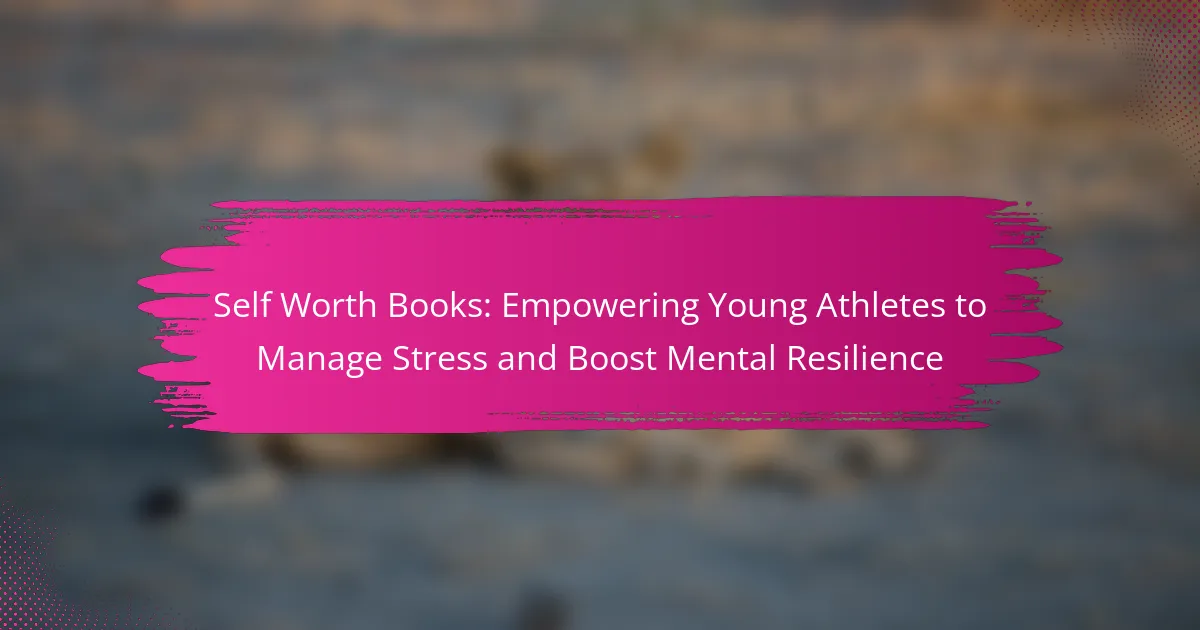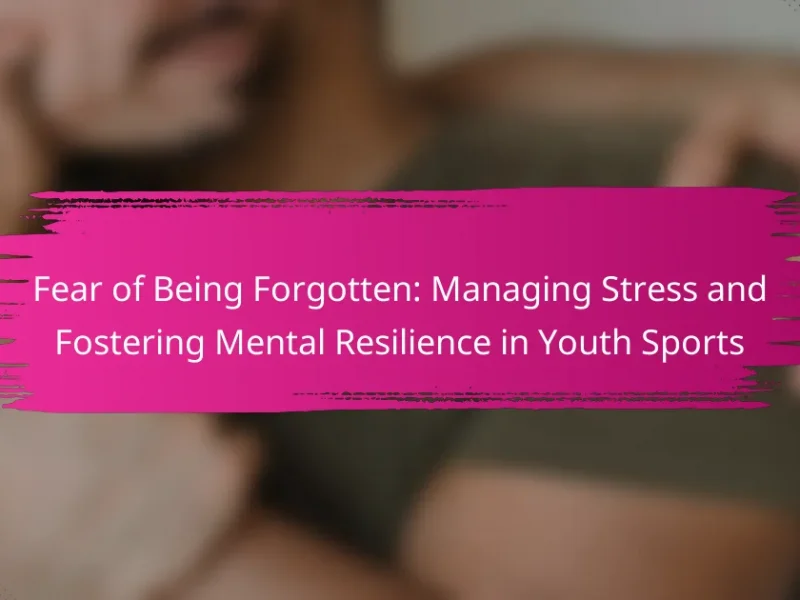Young athletes often face immense pressure, making stress management crucial for their performance and well-being. Self Worth Books provide strategies for self-acceptance and resilience, helping athletes recognize their intrinsic value. These resources emphasize emotional intelligence and coping skills, fostering a growth mindset that transforms challenges into opportunities. By integrating practical exercises, they empower young athletes to navigate competition with enhanced mental clarity and strength.

How Can Self Worth Books Support Young Athletes in Managing Stress?
Self Worth Books can significantly aid young athletes in managing stress by providing strategies for self-acceptance and resilience. These books often include practical exercises that help athletes recognize their intrinsic value beyond performance metrics. This focus on self-worth reduces anxiety and improves mental clarity during competitions. Furthermore, the narratives within these books can foster a growth mindset, encouraging young athletes to view challenges as opportunities for development rather than threats. By integrating lessons on emotional regulation and coping mechanisms, Self Worth Books empower young athletes to navigate stress effectively.
What are the Key Themes in Self Worth Books for Young Athletes?
Self worth books for young athletes focus on themes of resilience, self-acceptance, and mental strength. These books empower athletes to manage stress effectively and cultivate a positive self-image. Key themes include building confidence through goal setting, understanding the importance of teamwork, and developing coping strategies for performance pressure. Additionally, they often emphasize the value of perseverance and learning from failure, fostering a growth mindset essential for athletic and personal success.
Why is Mental Resilience Important in Youth Sports?
Mental resilience is crucial in youth sports as it helps young athletes cope with challenges and stress. Developing mental resilience enhances self-worth, enabling athletes to perform better under pressure. Research shows that resilient athletes are more likely to maintain focus and motivation, leading to improved performance and enjoyment in their sport. Additionally, self-worth books can provide valuable strategies for managing stress, fostering a growth mindset, and building confidence. These resources empower young athletes to navigate the ups and downs of competition, ultimately contributing to their overall well-being and success in sports.

What Universal Strategies Do Self Worth Books Offer for Stress Management?
Self worth books offer universal strategies for stress management by promoting self-acceptance, resilience, and coping skills. These books empower young athletes to recognize their intrinsic value, which helps reduce anxiety and build mental strength. Techniques such as positive affirmations and mindfulness exercises are commonly included, supporting athletes in managing competitive pressures effectively. By fostering a growth mindset, these resources encourage young athletes to view challenges as opportunities for development, enhancing their overall performance and well-being.
How Can Positive Self-Talk Enhance Performance?
Positive self-talk enhances performance by fostering confidence and reducing anxiety in young athletes. This mental strategy enables them to manage stress effectively, leading to improved focus and resilience during competitions. Studies show that athletes who engage in positive self-talk experience up to a 20% increase in performance metrics. By incorporating self-worth books into their routine, young athletes can develop these skills, reinforcing their belief in their abilities and enhancing their overall mental toughness.
What Role Does Goal Setting Play in Reducing Anxiety?
Goal setting significantly reduces anxiety by providing young athletes with clear objectives and a sense of control. This structured approach enhances self-worth, allowing them to manage stress effectively. Studies show that setting specific, measurable goals improves focus and motivation, which are crucial for mental resilience. By tracking progress, athletes gain confidence, further alleviating anxiety.
What are Effective Goal-Setting Techniques for Young Athletes?
Effective goal-setting techniques for young athletes include setting SMART goals, maintaining a positive mindset, and utilizing visualization. SMART goals are Specific, Measurable, Achievable, Relevant, and Time-bound, ensuring clarity in objectives. A positive mindset fosters resilience against stress, while visualization techniques enhance performance by mentally rehearsing success. These strategies empower young athletes to manage stress and build mental resilience, crucial for their development.

What Unique Perspectives Do Self Worth Books Provide on Mental Development?
Self worth books offer unique perspectives on mental development by emphasizing self-acceptance and resilience. These books empower young athletes to recognize their intrinsic value, which enhances their ability to manage stress effectively. They provide strategies for overcoming negative self-talk and cultivating a growth mindset. Research indicates that fostering self-worth can lead to improved performance and emotional well-being in competitive environments. Furthermore, these resources often include practical exercises that encourage reflection and personal growth, making them invaluable tools for mental resilience.
How Do These Books Address the Emotional Challenges of Competition?
Self Worth Books effectively address the emotional challenges of competition by fostering resilience and self-acceptance. These books provide strategies for young athletes to manage stress, emphasizing the importance of intrinsic value over external validation. They explore themes of self-compassion, helping athletes navigate the pressures of competition while maintaining mental well-being. By promoting a growth mindset, these resources empower athletes to view challenges as opportunities for personal development rather than threats to their self-worth.
What Unique Exercises Are Suggested for Building Self-Esteem?
Engaging in unique exercises can significantly enhance self-esteem in young athletes. Activities such as mindfulness meditation, positive visualization, and gratitude journaling are effective. These exercises promote self-awareness, encourage positive self-talk, and help manage stress. Incorporating team-building activities also fosters a sense of belonging and support.

What Rare Attributes of Self Worth Books Make Them Stand Out?
Self worth books uniquely empower young athletes by focusing on emotional intelligence, resilience-building techniques, and personalized strategies. These rare attributes distinguish them from conventional self-help literature. Emotional intelligence enhances athletes’ ability to navigate stress effectively, fostering a deeper understanding of their emotions. Resilience-building techniques provide practical tools for overcoming challenges, promoting mental toughness. Personalized strategies cater specifically to the unique pressures faced by young athletes, ensuring relevant and actionable guidance. These elements collectively create a distinctive resource that supports holistic development in sports and life.
How Do Personal Stories in These Books Inspire Young Athletes?
Personal stories in self-worth books inspire young athletes by showcasing resilience and perseverance. These narratives provide relatable experiences, helping athletes understand their struggles are shared. They highlight the importance of self-acceptance, motivating young athletes to embrace challenges. As a result, these stories foster mental resilience, encouraging athletes to manage stress effectively.
What Innovative Approaches Are Used to Teach Resilience?
Innovative approaches to teach resilience include utilizing self-worth books tailored for young athletes. These books focus on managing stress and enhancing mental resilience through relatable narratives and practical exercises. They encourage self-reflection, promote positive self-talk, and provide strategies for overcoming challenges. Integrating these resources into training programs fosters emotional intelligence and builds a supportive community among young athletes.

How Can Parents and Coaches Use Self Worth Books Effectively?
Parents and coaches can effectively use self-worth books by integrating them into regular discussions and practices. These books provide strategies for young athletes to understand their value, manage stress, and build mental resilience.
Encouraging daily reflections on the book’s content can deepen understanding. For example, discussing key lessons after training sessions reinforces the material. Additionally, creating a supportive environment where athletes feel comfortable sharing their thoughts fosters open dialogue.
Incorporating exercises from these books into training routines enhances their practical application. Coaches can assign specific chapters as homework, prompting athletes to apply concepts in real-life scenarios. This unique approach not only boosts engagement but also reinforces learning.
Lastly, tracking progress through goal-setting tied to the book’s themes can motivate young athletes. By celebrating small achievements linked to self-worth concepts, parents and coaches can help athletes internalize these lessons, ultimately improving their overall performance and well-being.
What Best Practices Should Adults Follow When Introducing These Books?
To effectively introduce self-worth books to young athletes, adults should create a supportive environment. Encourage open discussions about mental resilience and stress management. Select age-appropriate titles that resonate with their experiences and challenges. Incorporate interactive elements, such as group readings or reflections, to enhance engagement. Monitor progress and provide positive reinforcement to foster a growth mindset.
What Common Mistakes Should Be Avoided When Discussing Stress with Young Athletes?
Young athletes should avoid discussing stress in ways that undermine their self-worth. Common mistakes include using negative language, making comparisons to peers, and dismissing their feelings. These approaches can lead to increased anxiety and decreased mental resilience. Instead, focus on positive reinforcement, encourage open conversations about emotions, and validate their experiences. This empowers young athletes to manage stress effectively and fosters a healthier mindset.
How Can Adults Foster a Supportive Environment for Young Athletes?
Adults can foster a supportive environment for young athletes by promoting self-worth through targeted literature. Self-worth books empower young athletes to manage stress and enhance mental resilience, offering practical strategies and relatable narratives. Encouraging discussions about themes in these books can build confidence and emotional intelligence. Additionally, creating a reading culture around these materials can strengthen community support, helping young athletes thrive both on and off the field.

What Are the Next Steps for Implementing Lessons from Self Worth Books?
To implement lessons from self-worth books effectively, focus on integrating their principles into training routines. Start by encouraging young athletes to engage in self-reflection practices, such as journaling about their experiences and feelings. Incorporate discussions about self-worth during team meetings to foster a supportive environment. Provide workshops that emphasize mental resilience techniques, including mindfulness and stress management strategies. Regularly assess athletes’ mental health and offer resources for further development. Finally, create a feedback loop where athletes can share their progress and challenges, reinforcing the community aspect of personal growth.
How Can Young Athletes Apply Insights from These Books in Their Training?
Young athletes can enhance their training by applying insights from self-worth books to manage stress and build mental resilience. These books provide practical strategies, such as positive self-talk and visualization techniques, which help athletes maintain focus during high-pressure situations. Additionally, they emphasize the importance of setting realistic goals and celebrating small achievements, fostering a growth mindset. Engaging with these concepts encourages young athletes to view challenges as opportunities for personal development, ultimately improving their performance and overall well-being.
What Resources Are Available for Further Learning and Support?
Books on self-worth for young athletes include “The Confidence Code for Girls” and “Mind Gym.” These resources provide strategies to manage stress and enhance mental resilience. Websites like Positive Psychology and the American Psychological Association offer articles and tools for further learning. Workshops and seminars focusing on youth sports psychology also provide valuable support. Engaging with local sports organizations can connect athletes with mentors and resources tailored to their needs.


